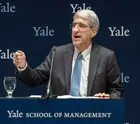
Connecting to Problems: Dean Edward A. Snyder on Nobel Laureate William Nordhaus
On October 8, the Royal Swedish Academy named Yale economist William D. Nordhaus the winner of the 2018 Nobel Prize in Economic Sciences, citing his work “integrating climate change into long-run macroeconomic analysis.”
On October 8, the Royal Swedish Academy named Yale economist William D. Nordhaus the winner of the 2018 Nobel Prize in Economic Sciences, citing his work “integrating climate change into long-run macroeconomic analysis.” The following is adapted from Dean Edward A. Snyder’s remarks at an event celebrating the prize.
This is a great day for economics and a great day for Yale.
I wanted to make two comments about William Nordhaus’s amazing career.
Professor Nordhaus chaired the Yale Carbon Task Force a few years ago. It’s a really interesting question: What if the market price for carbon-related products is below the price that we think it ought to be given potential externalities? What Bill took on was, well, how do institutions who are concerned about that discrepancy adapt their behaviors and correct for over-consumption?
This particular task force got into a lot of nitty-gritty issues. How are costs distributed through an organization? What happens if you have some buildings that are leaky and some that are tight? What are the tax effects of trying to correct this? How does the organization have incentives to make adjustments that make sense? A fascinating inquiry, but the point is that the task force wasn’t just a sideshow to do something for Yale; it reflected his connectivity to problems and solutions; and I you see that throughout his life’s work.
The second thing I wanted to mention is the way he connects with people about important issues, and one of my favorite examples is in a book on gains from medical research. Professor Nordhaus poses the question: If I look ahead to 2020, which of the following two options would I prefer: to have medical technology associated with 2020, but all other goods being back in the 1980s, or as the other option, to have all the fancy goods, devices, the internet, and so forth, with 1980s health technology? Which would I like?
As soon as you ask that question, then it makes the issue accessible to lots of people. Economists don’t typically measure the gains from life expectancy, improvements in life quality, etc., but by looking at it that way, you realize those gains are really important to the gains that we typically do measure. He has a great ability to ask questions in ways that connect big problems to everyday people and policymakers.



